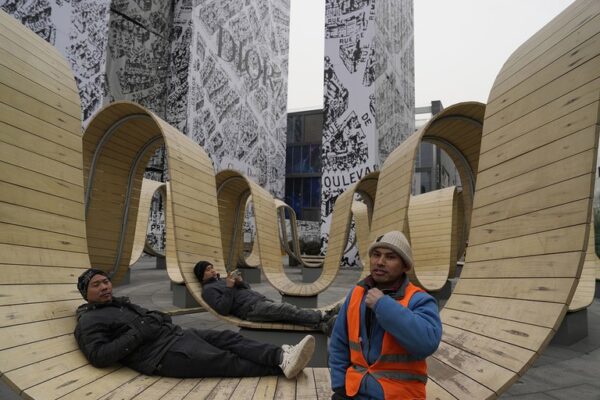
Hong Kong journalists’ new norm is to do a job under ‘unclear’ laws
For Hong Kong journalists, there is absolutely no room for old habits, even if they die hard. The city’s second national security law passed swiftly last week has widened the scope of what constitutes a breach of national security. It has also raised the risk of news reporting which has already increased since the Beijing-imposed first law came in 2020 and China increasingly encroached on the city. “What had been habitually acceptable, normal practice before, is no longer the case,” said a veteran journalist who declined to be named. “Journalists have to relearn and recalibrate.” This means throwing into the wind best practices in journalism. In their place, the most experienced practitioners are learning by reviewing daily how government officials posture and how the court rules, the veteran journalist told Radio Free Asia. Another seasoned journalist who also spoke on condition of anonymity said while the immediate effects of the new law officially known as the Safeguarding National Security Ordinance have yet to be seen, the editorial process – from a journalist reporting the news to editors editing the story for publication – has become much more complex. “For instance, if you have a scoop on a new government policy – would you report and publish that or would it be a breach of law? We don’t know what is considered lawful or what can become questionable,” the seasoned journalist explained, echoing the veteran journalist’s view of the unease that has been clouding the media since 2020. The change in journalistic practices started nearly four years ago, after China’s parliament passed the National Security Law. However, the introduction of the Safeguarding National Security Ordinance last week, also referred to as Article 23 based on a clause in Hong Kong’s mini constitution, the Basic Law – has intensified the concerns and uncertainties that Hong Kong journalists have faced over the past few years. While there are overlaps with the first law, Article 23 has also created new offenses, given increased punishment for offenders and afforded the government sweeping new powers to crack down on all forms of dissent on the grounds of treason, insurrection, sabotage that endangers national security, external interference in Hong Kong’s affairs, and espionage and theft of state secrets. “National security” in Article 23 is defined as identical to the first law, by China’s definition, which journalists and critics viewed as vague and heightened uncertainties. In both laws, national security refers to “the status in which the state’s political regime, sovereignty, unity and territorial integrity, the welfare of the people, sustainable economic and social development, and other major interests of the state are relatively free from danger and internal or external threats, and the capability to maintain a sustained status of security.” Henry Tong, an exiled Hong Kong activist who is currently living in Taiwan, tears a a piece of cardboard with 23 on it, during a protest against Hong Kong’s Article 23 law in Taipei, Taiwan, March 23, 2024. (Ann Wang/Reuters) Under Article 23, insurrection and sabotage can be punished with life imprisonment. Jail terms for sedition are increased from two years to seven, or 10 if alleged perpetrators are found to have colluded with a foreign force. The law also allows for a lengthening detention period without charge from 48 hours to two weeks, as well as expanded the British colonial-era offense of “sedition” to include inciting hatred against the leadership of the Chinese Communist Party. The Hong Kong government had not responded to Radio Free Asia’s request for comment on Article 23’s effect on journalists at the time of publication. When uncertain, self censor Journalists who remained in the field observed that self censorship is now second nature in the profession and on the increase in Hong Kong, once Asia’s bastion of free press and expression, and one of the very virtues that helped propel the city to an international financial center. “Before, you just report the news; as balanced as you can be, after getting all sides of the issue. Now, you would think twice and more times, whether to even report. It’s become a collective decision involving more editors and often lawyers,” said the seasoned journalist. “Or you simply don’t report.” Article 23 can also apply to actions that take place outside Hong Kong – by both residents and businesses – a move seen as key to what critics described as China’s “long arm” to hunt down overseas pro-democracy activists and “anti-China elements.” “It also makes reporting about overseas protests as journalists previously did, risky because you might be seen as providing a platform to these organizations abroad,” pointed out the veteran journalist, adding that these days, the approach is to wait for an official line from the Hong Kong government before publication of such types of news. Indeed, Hong Kong media outlets were sparing in coverage of overseas protests against the first day of Article 23’s implementation on Saturday. When they did, the angle was to convey the annoyance of citizens of foreign cities unsettled by the chaos created by the demonstrations. A case in point: HK01, an online news portal in Hong Kong, reported Saturday on disgruntled Taiwanese people who told protesters, many of whom were immigrants from Hong Kong, at a Taipei rally to “go back to Hong Kong” and not to mess up Taiwan. Robert Tsao, founder of United Microelectronics Corp., speaks with his staff after a news conference in Taipei on Sept. 1, 2022. (Ann Wang/Reuters) At the same reported Taipei event in the bustling Ximen district, demonstrators were joined by Robert Tsao, founder of chip-making giant United Microelectronics Corporation and former Hong Kong resident, who blasted the Chinese Communist Party for upholding authoritarianism in the guise of national security and through the “laughable” concept of “subverting the nation” when the country and regime are separate notions. “The CCP has tied the political regime with the country, which is a scam and extremely absurd,” Tsao said, as he warned that the fate of Taiwan and Hong Kong…






